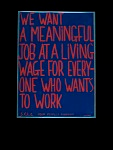Succeeding King: Ralph David Abernathy, SCLC, And The Long Civil Rights Movement
View
@ University of Mississippi Libraries
Blusiewicz, Scott
Description
As president of the Southern Christian Leadership Conference, Martin Luther King Jr. emerged as Americas most prominent civil rights activist during the late 1950s and the 1960s. Due to his eloquent speeches and ability to organize large-scale nonviolent protests, King inspired numerous individuals to participate in a grassroots movement for equal rights. After earning two landmark victories with the passage of the Civil Rights Act of 1964 and the Voting Rights Act of 1965, King and his SCLC colleagues shifted the focus of their work to improving economic opportunities for Americas poor citizens. To combat poverty, King planned an ambitious protest designed to force Lyndon Johnson and the U.S. Congress to face the stark reality that millions of Americans remained impoverished. Yet an assassin killed King weeks before the launch of his Poor Peoples Campaign. As a result, Ralph David Abernathy, Kings designated successor, inherited the daunting task of leading the largest direct action campaign since the Voting Rights March three years earlier. In addition to directing the campaign, Abernathy encountered a series of unfavorable circumstances as he attempted to advance Kings goal of eradicating poverty by fundamentally altering Americas economic and political systems. These circumstances included a poor relationship with Johnson and his successor, Richard Nixon, internal dissension within SCLC, and increasing apathy from the American public. Despite these obstacles, Abernathy fought to keep SCLC and the civil rights movement alive for nearly a decade. In order to understand the diminishing influence of the movement in the 1970s, one...
Text
Application/Pdf
2017 01 01 T08:00:00 Z


















![Reference. Poor People's Campaign [Southern Christian Leadership Conference]. (Box 43, Folder 14) Reference. Poor People's Campaign [Southern Christian Leadership Conference]. (Box 43, Folder 14)](https://d2l9jrtx1kk04i.cloudfront.net/7a0c020e26649b8c4f376c3d4b124059579f6df8.png)
